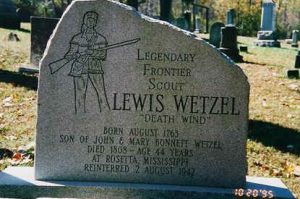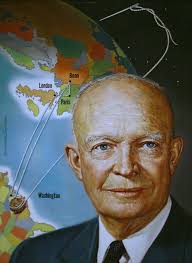Editor’s Note: Much of this is taken from the InfoGalactic article on Lewis Wetzel, which is linked below.
Lewis Wetzel (February 24, 1752 -1808) was a frontiersman and Indian fighter who roamed the hills of western Virginia and Ohio. Wetzel is regarded as a hero by many Americans. He was accused in 1788 of the murder of peaceful Indians, but he escaped and there was no trial.
Lewis was the son of a German emigrant named John Wetzel, who was later killed by Indians, and Mary Bonnet, daughter of Jean Jacques Bonnet of Friedrichstal, Baden, Germany. The Wetzel and Bonnet families moved to the Wheeling Creek area in what is now the northern panhandle of West Virginia in 1770. The Wetzel family settled on a section far upstream from the Ohio River in a fairly isolated location.
In 1777, Lewis, then 13, and his brother Jacob, 11, were taken prisoner by Indians, but managed to escape. Lewis was shot in the leg during the capture. The young man vowed to avenge his family. Lewis and Jacob managed to return to the location of what is now Wheeling, West Virginia, which was then called Fort Henry. Lewis played an active part in the defense of that fort in the first siege of Fort Henry a couple of weeks after his escape.
Wetzel later participated in some of the military campaigns against the Indian tribes in the Ohio region. Between the years of 1782 and 1787, he killed several Indians. He preferred to operate alone; military procedure did not suit him while serving with the militia.
Lewis was implicated in the deaths of several Indians, which led to his being charged with murder by Colonel Josiah Harmar for the murder of an Indian in the region of Fort Harmar, near present day Marietta, Ohio, in 1788. Lewis escaped before his trial. According to legend, Lewis and Clark asked Wetzel to join their expedition but he declined. This is unlikely to have actually occurred, as neither Lewis or Clark mention Wetzel in their letters or diaries, and they were under strict orders to explore, not fight.
 Accounts vary as to his life after that point. Some accounts state he died in 1808 in Mississippi, at the residence of his cousin Philip Sykes. Some accounts say he married a Spanish woman and lived to an old age. The 1808 date was probably correct, as a skeleton matching the description of Wetzel, which was buried along with a rifle and other equipment, as legend had it, was found at what was the former farm of Philip Sykes. This skeleton was reinterred in McCreary Cemetery in Marshall County, West Virginia.
Accounts vary as to his life after that point. Some accounts state he died in 1808 in Mississippi, at the residence of his cousin Philip Sykes. Some accounts say he married a Spanish woman and lived to an old age. The 1808 date was probably correct, as a skeleton matching the description of Wetzel, which was buried along with a rifle and other equipment, as legend had it, was found at what was the former farm of Philip Sykes. This skeleton was reinterred in McCreary Cemetery in Marshall County, West Virginia.
His most famous trick was his ability to load his black powder gun while sprinting. His skills in what we now characterize as guerrilla warfare were justly famous. He was some six feet tall, striking, and very athletic. He was a good fiddle player and good with children.
Wetzel hated Indians. He scalped the Indians he killed. He grew his hair out almost to the ground, to taunt the Indians with what would be an unmatchable trophy. The Indians gave him the nickname “Deathwind” because of his ability to reload his rifle at a full run.
His devotion to his people, and his willingness to do what was required to protect, provide, and avenge them makes him a true Man of the West.









“His most famous trick was his ability to load his black powder gun while sprinting.”
Whoa. A million years ago when I was younger and the continents hadn’t fully separated, we had a fellow do a demonstration on how to load a black powder gun. It wasn’t easy. Wetzel doing that while running is simply amazing, almost superhuman.
“His devotion to his people, and his willingness to do what was required to protect, provide, and avenge them makes him a true Man of the West.”
Amen. People like him are folk heroes for a reason.
5
I am Robert Hand & I have. now the largest collection on Lewis Wetzel, I have made many presentations. one was on September 20th, 1992, with a sellout preferments At the Mason House, with many others. My collection was valued at thirty million dollars. I have also the court trial papers. Which are complete? Also in 1994 I opened the grave site at Rossetta Mississippi, with the help of Wayne Havard, & my friend Gary Webster of Vicksburg, Mississippi. Lewis Wetzel died in 1829, Which these manuscripts were on display for the public to view at the Manion House, where George Carol who was one of my speakers, along with my informant, who had existed. to my collection, there are many films that I gave. To Barbara Plants, with the first dig by Dr. Albert W. Bowser, I have all of these films with the dig with Dr. Bowser in 1942, & all the Havard, & the Clair family. My life’s work will be shown to the public, in due time. I was taken advantage of with power & control. Its all about money it’s their God. They even came out with a book on Simon Girty with a sex affair with Gen. Edward Hand. Everyone who was going to write for me. had excess to my notebooks & published on my work. The part I don’t like is the rewriting of history. I lost my military pension, for fighting back for the people who made this a nation. My collection will be settled with videos. & with many people who are on my side for this was a complete set up to take my life’s work. I have tried to be helpful with everyone. But money talks & the Bull walks. I probably want to hear from you. with this matter. But I hope this never happens to any human being It was done quiet & sneaky. I will be glad to help you with the correct information on the Wetzel Family, I have collected over one million documents in my lifetime. & two million donated to me. I have been totally. blacklisted, for my blood sweat & tears. Thank you: Robert Hand